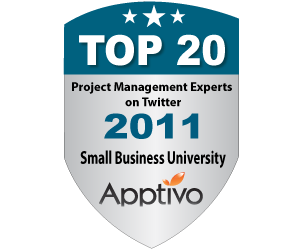Collaboration is defined as, the action of working with someone to produce or create something. Any successful project team requires collaboration. This is collaboration between the Project Manager, Business Analysis, the entire team and upper management to build a
strong bridge to success. Today we will
focus on the Best Practice in PM/BA
Collaboration educational track.
A Project Manager defined by the Project Management Book of
Knowledge (PMBOK fourth edition) is, the
person assigned by the performing organization to achieve the project objective.
According to the Business Analysis Body of Knowledge (BABOK version 2.0), business analysis is the practice of enabling
change in an organizational context by defining needs and recommending
solutions, which deliver value to stakeholders. A Business Analyst should use
their experience and their best judgment to determine which techniques are best
for the project or situation.
Not that long ago, both of these jobs would be performed by
either the Project Manager, working as both a Project Manager and Business
Analyst or Business Analyst working also as a Project Manager. However, with the better understood and
growing popularity of the individual body of knowledge of Project Management
and Business Analysts and the growing complexity of projects, both of these
areas are becoming more specialized.
At the PW&WCBA, there is an educational track to address
both of these disciplines and the importance of collaboration. Beginning after lunch on day two, the first
session begins with a presentation from Ellen
Gottesdiener, Principal Consultant and Founder or EBG Consulting, Inc. Ellen is presenting, It’s the Goal, Not the Role: Work of Project Management and Business
Analysis in Agile. This presentation
will help answer the following questions; How are the Project Manager and
Business Analyst roles defined on Agile projects. How do these roles align with Scrum, lean and
other agile methods? What are the
skills? The great thing about this presentation is, you do not have to be
currently working on Agile projects to learn from this session.
The next session is titled, Let’s Collaborate Not Tolerate:
How to Build a Successful BA/PM Partnership, given by Paula A. Bell, CEO of Paula A. Bell
Consulting, LLC. This presentation will
provide best practices, as well as tip and tricks on creating a collaborative
environment between the Business Analyst, Project Manager and team. This presentation will include building
relationships, fostering a collaborative environment and maintaining a positive
partnership. A collaborative team is a
more efficient and successful team.
The final session on day two in this track is, Soft Skills for Effective Collaboration,
presented by Maureen McWhite a
Business Applications Analyst with FedEx.
Soft skills are defined as, personal attributes which enable someone to
interact effectively and harmoniously with other people. This is interpersonal relationships, or how
well do you get along with others. Soft
Skills is something, which is difficult to teach. This presentation will provide tools and
techniques to help the Project Manager, Business Analyst and the team to
develop their soft skills. The focus of
this presentation will include how to avoid communication pitfalls, learning
how to push back with logic and how to build and improve relationships. Key to soft skills success is communication
and collaboration.
Beginning the third and final day, Day three: Project Spotlight
Framework of Architecture, Integration and Security: OUC Brings a Layer of Design Authority in its
Projects. Hedi Ago, is a Manager, of Major Project Delivery and Governance
for the Orlando Utilities Commission (OUC).
Hedi is also the President of the PMI Central Florida Chapter and well
versed in project complexities. Some of
projects biggest challenges are the verticals, infrastructure, integration and
security. This presentation is how this
company has created a space outside of the PMO called, Project Design
Authority. This space is designed to
concentrate on the verticals and help with the complexities of projects. Again, the key is collaboration.
Continuing on day three, you will learn the Keys to Successful Communication in a Global Project Environment. This is presented by Abby Hodge, PMP, MPM, Director of Project Management Office, at Stage Stores, Inc. If you work in a global or virtual environment this presentation is a definite must see. Learn how to improve communication with intention and authenticity. Setting level expectations, improve decision making on project issues and risks, stakeholder management, how to make a virtual team feel more personalized and deciding when face-to-face communication should be used over all other forms of communication.
The final session in this track on day three is, Mind Mapping Techniques to Improve project
Brainstorming, Collaboration and Planning.
This is presented by Jim Franklin,
P.E., PMP, Project Manager of CB&I. A
mind map is defined as a diagram used to represent words, ideas, tasks, or
other items linked to and arranged around a central key word or idea. By using mind mapping teams are able to
create the project planning documents more quickly. In this presentation, you will learn the
best practices using mind mapping or mind mapping software to brainstorm,
collaborate and create project plans.
Any tool, which can help create team work and speed up the creation of documents,
is a definite plus!
These sessions will help a Project Manager better understand
the role and challenges of a Business Analyst, as well as help a Business
Analyst to better understand the challenges and needs of a Project Manager. If you want less stress on your projects, I believe collaboration is necessary with every team
member and every aspect of a project. These skills can be learned
and improved by attending the 2013 Project World &
World Congress for Business Analysts . Be sure and register today at http://bit.ly/13jM72A and
bring your team!







No comments:
Post a Comment